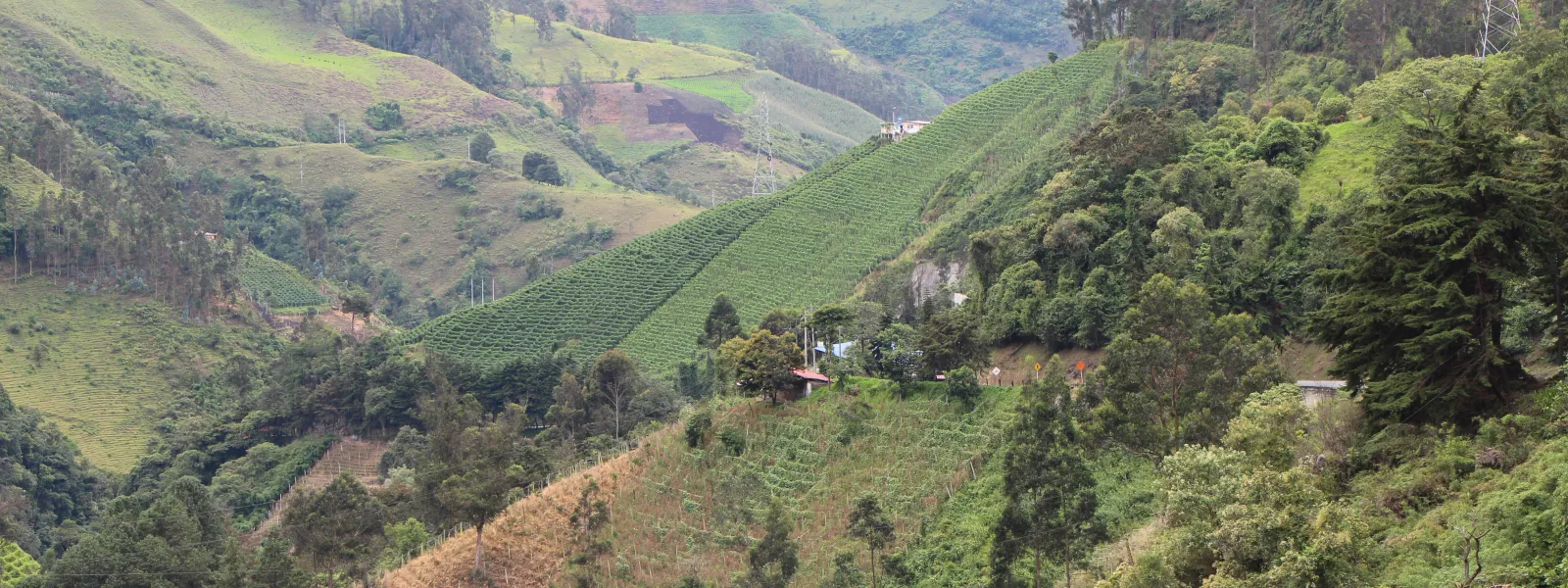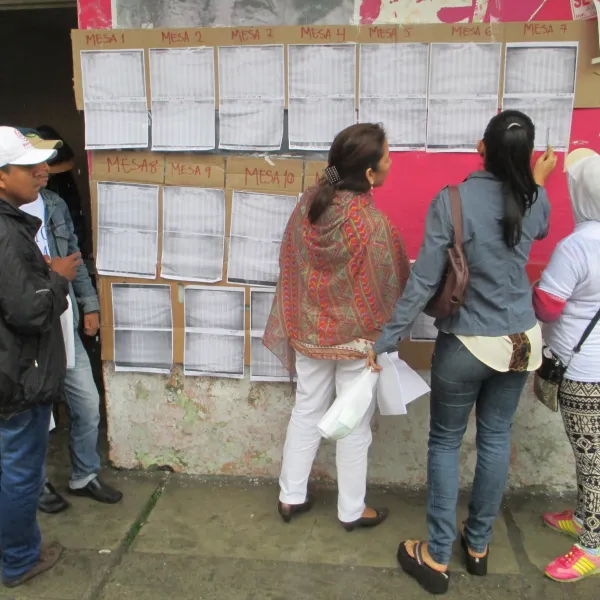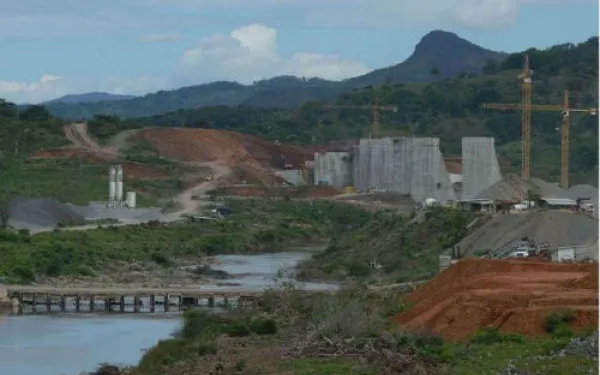
Project
Photo: Andrés Ángel / AIDASupporting Cajamarca’s fight to defend its territory from mining
Cajamarca is a town in the mountains of central Colombia, often referred to as "Colombia’s pantry” due to its great agricultural production. In addition to fertile lands, fed by rivers and 161 freshwater springs, the municipality features panoramic views of gorges and cloud forests. The main economic activities of its population—agriculture and tourism—depend on the health of these natural environments.
The fertile lands of Cajamarca are also rich in minerals, for which AngloGold Ashanti has descended on the region. The international mining conglomerate seeks to develop one of the world’s largest open-pit gold mines in the area. Open-pit mining is particularly damaging to the environment as extracting the metal involves razing green areas and generating huge amounts of potentially toxic waste
The project, appropriately named La Colosa, would be the second largest of its kind in Latin America and the first open-pit gold mine in Colombia. The toxic elements that an operation of that magnitude would leave behind could contaminate the soil, air, rivers and groundwater.
In addition, storms, earthquakes, or simple design errors could easily cause the dams storing the toxic mining waste to rupture. The collapse of similar tailings dams in Peru and Brazil in recent years has caused catastrophic social and environmental consequences.
On March 26, 2017, in a popular referendum, 98 percent of the voters of Cajamarca said “No” to mining in their territory, effectively rejecting the La Colosa project. AIDA is proud to have contributed to that initiative. But even with this promising citizen-led victory, much work remains.

Related projects

Four Recommendations for the Summit of the Americas
Inequality has increased in the last decades in Latin America, and this clearly is an obstacle for democracy. Latin America remains the region with the greatest income inequality on the planet. Considering this, the Organization of American States has made "Prosperity with Equity" the theme of its upcoming Summit of the Americas. In Panama on April 10 and 11, Heads of State and Government will pledge concerted actions at both the national and regional levels to confront the development challenges of the continent. I believe that the main goal should be to just stop doing certain things, or, at least, to act differently. When I asked Eli, an indigenous Ngobe from Panama, what she wanted from her government, she said, "Just that they leave us alone." Drawing on OAS consultations with civil society, AIDA analyzed two of the eight Mandates for Action, the document to be negotiated at the Summit. From this analysis, we have made the following recommendations relating to the mandates on energy and the environment: 1. Stop building large dams The Mandates establish that the region will join the United Nations Initiative, Sustainable Energy for All (SE4ALL). Since access to energy plays a key role in reducing inequality, we recommend working with this initiative provided hydroelectric dams are excluded from sustainable energy. Among other harms, Dams produce greenhouse gases, aggravating climate change, especially in tropical regions. Dams cause irreparable harms to the environment and human rights violations. Dams typically cost twice as much as their developers’ estimates, even without considering their socio-environmental damages. In addition, constructing these energy dinosaurs takes much more time than expected. Three currently suspended dams prove the point: Belo Monte (Brazil) - Suspended after protests of affected communities whose compensation had been breached. It is a year late, and the project is facing fines and the possible payment of additional interest on loans from Brazil’s national development bank, BNDES. El Quimbo (Colombia) - The filling of the dam is suspended by judicial order for lack of an evaluation of its impact on the fishing sector. Barro Blanco (Panama) - Suspended by an order of the government while they revise—and hopefully fix—irregularities in the Environmental Impact Assessment. From all this, we remind the Summit of the Americas that last December more than 200 organizations, networks, and movements from across the world requested that governments, international organizations, and financial institutions realize that large dams are an unsustainable source of energy and implement truly sustainable solutions. 2. Recognize the human rights impact from climate change Climate change has caused and will continue to cause serious impacts in Latin America that are compromising the enjoyment of human rights. Climate change is a priority on the Summit’s agenda, which is good. But government leaders should incorporate an understanding of the relationship between climate change and human rights. They should commit to respect human rights in all climate actions. The United Nations and the OAS General Assembly have recognized that the respect for and enjoyment of human rights are intrinsically connected to climate change. The World Bank has concluded that climate change complicates efforts to end poverty, which has clear implications on human rights. Even the recent draft of the negotiating text of the United Nations Framework Convention on Climate Change contemplates the necessity to respect human rights. For all these reasons, the Summit should consider that the link between climate change and human rights must be incorporated into all actions seeking to combat inequality and promote better standards of living. 3. Include a commitment to mitigate climate change, not just adapt to it The Summit’s Mandates for Action refer to adaptation measures. But mitigation should not be left out. These actions would reflect the reality of the region, in which important efforts are being developed to confront climate change. Considering the principle of common but differentiated responsibilities, all States must demonstrate willingness to implement mitigation actions to confront climate change. Although not all States should mitigate to the same extent, all countries should contribute to this task—including those in Latin America. 4. Recognize that corruption undermines equity, and include actions to eradicate it The Mandates for Action recognize the impacts of corruption in as much as the use of technology is intended to improve public participation. But corruption is a structural problem in the region and actions to confront it should be part of democratic governance. Corruption has a direct relationship with inequality, systematically preventing real progress in the fight against poverty.
Read moreGeneva Conference must give clarity to climate finance
Negotiations for a new climate agreement, initiated last December during the United Nations Framework Convention on Climate Change (COP 20) in Lima, Peru, will continue this week in Geneva, Switzerland. Delegates there will work on detailing the various elements to be included in the negotiating text of the new climate agreement, including climate finance. Climate finance is a key factor in enabling developing countries to confront climate change effectively. "We hope the Geneva session concludes with a negotiating text that provides clarity for predictable and sustainable financing," said Andrea Rodriguez, attorney with the Interamerican Association for Environmental Defense (AIDA). "The agreement needs to establish with certainty the sources of finance, which institutions will mobilize and manage them, and how they will be disbursed, in order to ensure that these efforts contribute to low-emission, climate-resilient development in developing countries." The Conference in Peru ended with the Lima Call for Climate Action, a document whose annexes contain the essential elements for a draft negotiating text of the new climate agreement, which will be signed later this year at COP 21 in Paris. Delegates in Geneva are expected to intensify work on those key elements, and produce a negotiating text that will have legal force under the United Nations Framework Convention on Climate Change. Given the importance of the Geneva conference, AIDA is providing climate finance recommendations for negotiators to incorporate into the draft text of the new climate agreement: Clear provisions regarding who is required to mobilize resources. Clear goals beyond 2020 for a road map towards annual public financing targets. Scaling up of resources to ensure compliance with the existing commitment to mobilize $100 million by 2020, and to allow countries to plan their climate actions. Predictable, adequate and sufficient climate finance to promote the transition to low-carbon, climate-resilient development in developing countries. 50:50 balanced allocation of resources for adaptation and mitigation actions. Definitions of climate finance and climate investment. Clarity on which climate finance institutions will operate under the convention. Recognition of the Green Climate Fund as the primary channel to mobilize resources, without the exclusion of other funds. Strengthen the mandate of the Standing Committee of Finance to enhance coordination and coherence of work between different financial institutions.
Read moreGeneva Conference must give clarity to climate finance
Negotiations for a new climate agreement, initiated last December during the United Nations Framework Convention on Climate Change (COP 20) in Lima, Peru, will continue this week in Geneva, Switzerland. Delegates there will work on detailing the various elements to be included in the negotiating text of the new climate agreement, including climate finance. Climate finance is a key factor in enabling developing countries to confront climate change effectively. "We hope the Geneva session concludes with a negotiating text that provides clarity for predictable and sustainable financing," said Andrea Rodriguez, attorney with the Interamerican Association for Environmental Defense (AIDA). "The agreement needs to establish with certainty the sources of finance, which institutions will mobilize and manage them, and how they will be disbursed, in order to ensure that these efforts contribute to low-emission, climate-resilient development in developing countries." The Conference in Peru ended with the Lima Call for Climate Action, a document whose annexes contain the essential elements for a draft negotiating text of the new climate agreement, which will be signed later this year at COP 21 in Paris. Delegates in Geneva are expected to intensify work on those key elements, and produce a negotiating text that will have legal force under the United Nations Framework Convention on Climate Change. Given the importance of the Geneva conference, AIDA is providing climate finance recommendations for negotiators to incorporate into the draft text of the new climate agreement: Clear provisions regarding who is required to mobilize resources. Clear goals beyond 2020 for a road map towards annual public financing targets. Scaling up of resources to ensure compliance with the existing commitment to mobilize $100 million by 2020, and to allow countries to plan their climate actions. Predictable, adequate and sufficient climate finance to promote the transition to low-carbon, climate-resilient development in developing countries. 50:50 balanced allocation of resources for adaptation and mitigation actions. Definitions of climate finance and climate investment. Clarity on which climate finance institutions will operate under the convention. Recognition of the Green Climate Fund as the primary channel to mobilize resources, without the exclusion of other funds. Strengthen the mandate of the Standing Committee of Finance to enhance coordination and coherence of work between different financial institutions.
Read more